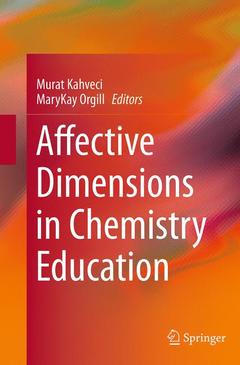Description
Affective Dimensions in Chemistry Education, Softcover reprint of the original 1st ed. 2015
Coordinators: Kahveci Murat, Orgill MaryKay
Language: English
Subjects for Affective Dimensions in Chemistry Education:
Publication date: 10-2016
Support: Print on demand
Publication date: 01-2015
318 p. · 15.5x23.5 cm · Hardback
Description
/li>Contents
/li>Biography
/li>Comment
/li>
Meeting educational objectives in the affective and cognitive domains: Personal and social constructivist perspectives on enjoyment, motivation and learning chemistry.- Evaluating the Affective Dimension in Chemistry Education.- Getting involved: Context- based learning in chemistry education.- Gender Perspective on Affective Dimensions of Chemistry Learning.- Intuitions about Science, Technology and Nature – A Fruitful Approach to Understand Judgments about Socio-Scientific Issues.- Implementing Inquiry-based Science Education to Foster Emotional Engagement of Special Needs Students.- Affect and meeting the needs of the gifted chemistry learner: providing intellectual challenge to engage students in enjoyable learning.- It’s the situation that matters - Affective involvement in context-oriented learning tasks.- Gathering psychometric evidence for ASCIV2 to support cross-cultural attitudinal studies for college chemistry programs .- Secondary School Students’ Chemistry Self-Efficacy: Its Importance, Measurement, and Sources.- Second Year College Students’ Scientific Attitudes and Creative Thinking Ability: Influence of a Problem-Based Learning (PBL) Chemistry Laboratory Course.- Neuroscience Engagement: The Influences of Chemistry Education on Affective Dimensions.- Evaluating Drawings to Explore Chemistry Teachers` Pedagogical Attitudes.- Chemistry Teachers` Attitudes and Needs when Dealing with Linguistic Heterogeneity in the Classroom.- Majors’ Gender-Based Affective States toward Learning Physical Chemistry.
Dr. Murat Kahveci / Canakkale Onsekiz Mart University, Turkey, mkahveci@comu.edu.tr
Dr. MaryKay Orgill / University of Nevada, Las Vegas, USA, marykay.orgill@unlv.edu
Murat Kahveci is an Associate Professor of Chemistry Education at Canakkale Onsekiz Mart University, who has dual master’s degrees both in physical chemistry and science education, and a doctor of philosophy degree in science education, awarded by the Florida State University. Since 2005, he taught various education and chemistry courses at higher education. In 2007, while holding a Senior Researcher position at the University of Chicago, he got the chance of developing his skills on large-scale science education projects and writing grant proposals to leading funding agencies in the U.S., such as National Science Foundation and Institute of Education Sciences. He was appointed by the European Commission (EU) in years 2008, 2009, and 2010 as an expert for reviewing the specific calls for IBSE under FP7 Science-in-Society Program. In 2012, he was invited to Brussels to attend a workshop as an expert about the future options of the
Science-in-Society Program and their expected impacts. He is the author of “Shared perceptions of professors about instructional interactivity” published by VDM Verlag Dr. Müller, Saarbrücken, Germany. Since Summer 2011, he has been serving as the Associate Editor of Electronic Journal of Science Education.
Dr. MaryKay Orgill is an Associate Professor of Chemistry at the University of Nevada, Las Vegas (USA). After a high school teacher told her that girls couldn’t “do chemistry,” she entered Brigham Young University as a chemistry major (B.S. 1995). She was surprised to find that she actually liked chemistry—and loved teaching it; so she enrolled in a graduate program at Purdue University to study both biochemistry (M.S. 1999) and chemical education (Ph.D. 2003). She continued to pursue both interests as a first-year faculty member with a joint ap
First book on the subject
Contributions from leading experts in chemistry education
Covers both fundamental considerations and practical case studies




